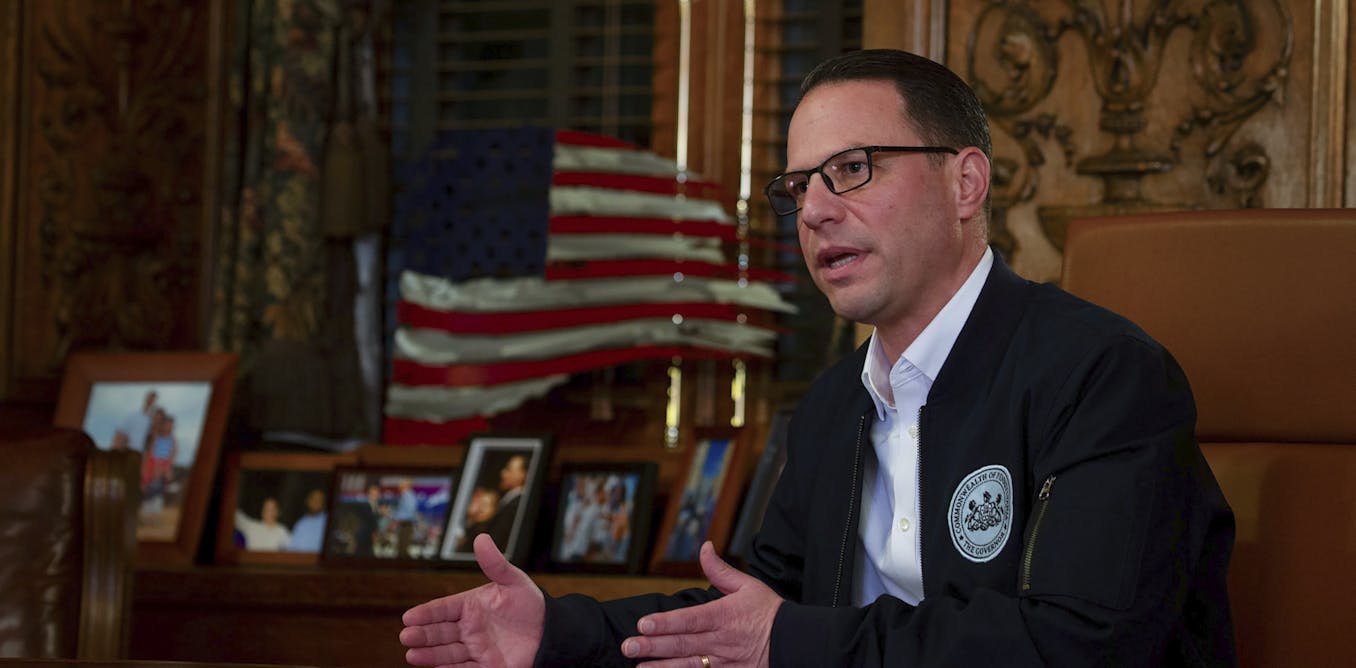Against Illinois governor JB Pritzker’s objections, Donald Trump’s Pentagon has ordered hundreds of national guard troops to join his regime’s assault on Chicago communities. Trump subsequently called for Brandon Johnson, Chicago’s mayor, and Pritzker to be jailed for not supporting his agenda. These are simply the latest steps in Trump’s plan not to govern as the president of all Americans but to rule as the dictatorial head of a punitive factional state. Federal funding to Democratic cities is being slashed through executive maneuvers; the justice department is conducting politically targeted investigations and arrests; and the military is being deployed to intimidate fellow citizens. Los Angeles, Portland, my home town of Chicago and other cities have been cast as enemies to be subdued, not communities to be served.
This weaponization of federal power represents a sharp break with constitutional tradition. It’s not merely ideological hostility; it is economic coercion and the exercise of violence in service of a president’s whim. The Trump regime is selectively starving Democratic jurisdictions of federal funds, even as their residents continue to pay billions in federal taxes, with blue states accounting for over 60% of the federal government’s revenue. We are being compelled to subsidize our own political subjugation.
As the anthropologist Janet Roitman argued in her study of taxation and sovereignty in central Africa, acts of “fiscal disobedience” emerge not simply as refusals to pay but as political interventions that expose ruptures in the reciprocal obligations underlying fiscal authority. Taxation is never merely technical. It is the material expression of political belonging and shared obligation. When the state weaponizes fiscal power against certain communities while continuing to demand unquestioned revenue from them, it undermines its own claim to legitimate authority. In such contexts, withholding or conditionally redirecting tax flows can become a way to re-politicize the fiscal relationship. It makes explicit that the state has already broken the social contract. Blue states today occupy precisely this position: forced to fund a federal government that is actively targeting them, their residents and their institutions.
Faced with this reality, Democratic governors need more than legal complaints and rhetorical protest. They need fiscal strategies of resistance commensurate with the scale of the attack. And one of the most provocative – and potentially powerful – ideas available is the creation of state-administered escrow accounts, or “in trust” funds, to temporarily hold federal tax revenues until the federal government upholds its constitutional obligations and withdraws its authoritarian threats.
This may sound radical, but it is less secessionist than it may at first appear. It would not involve refusing to pay federal taxes outright, which would open individual taxpayers to prosecution. Instead, the state would act as a temporary custodian, receiving payments from residents and businesses equal to their federal tax liabilities, holding them in trust for the federal government, and releasing them only when certain constitutional conditions are met – such as the partisan cessation of federal defunding and the withdrawal of military deployments unauthorized by targeted states.
Such a maneuver would constitute a form of civil disobedience by a state, legally risky and certain to entail confrontation. But Democratic cities and states, progressive non-profits, universities, non-white immigrants, and public health institutions are already facing direct conflict with Trump’s government. This strategy would reset the terms of the conflict and reclaim power against an increasingly brazen Trump regime. It would also underline for everyone the authoritarian, violent nature of the federal government’s tactics rather than allowing them to proceed under the thin guise of “law and order”, as Trump leverages his control over legal systems to wage war against his personal enemies. It would transform what is now a one-sided assault into a constitutional struggle.
How it could work
States could establish this system through legislation to create a tax receivership fund, explicitly designated as a trust account for federal tax liabilities. Residents and businesses would make payments into this account instead of directly to the Internal Revenue Service (IRS). The state would acknowledge these payments as received on behalf of the federal government, and pledge to remit them in full once specific, legally defined conditions were met – say, the restoration of suspended federal funding and reversal of other punitive actions that violate constitutional guarantees.
Importantly, this scheme does not purport to nullify federal taxes or claim state sovereignty over them. It functions as a conditional remittance mechanism, akin to an escrow arrangement in contract law. Of course, the Trump-controlled IRS, which has already been weaponized by the regime, would not quietly accept this. It would likely treat payments into the state trust as non-payment and impose penalties. Legal challenges would ensue. But that is precisely the point: to force a constitutional confrontation over whether the federal government can target states for political punishment while continuing to demand unquestioned fiscal obedience.
For such a strategy to work, it cannot be the isolated action of a single state. A state acting alone could be punished, scapegoated, or financially squeezed into submission. But if multiple states act simultaneously, they can transform isolated legal defiance into a coordinated assertion of constitutional co-sovereignty.
Here, article I, section 10 of the constitution could offer an eventual tool: interstate compacts. These are agreements between states – subject to congressional consent, and thus not likely legally viable until and unless Democrats win back congressional majorities – that allow them to formally coordinate policy, pool resources, and create collective governance structures. With or without congressional approval, blue states could form a “fiscal sovereignty compact” to coordinate the legal, fiscal, and political strategies involved in holding federal taxes in trust. It could standardize escrow mechanisms across member states, ensuring legal coherence and shared administrative capacity; create a pooled legal defense fund to support court battles; coordinate triggers for releasing funds, so that the federal government faces a unified set of demands; and protect against selective federal retaliation by presenting a united front representing tens of millions of residents and trillions in economic output.
This compact would not need to involve all blue states to be effective. A coalition of economically powerful states – such as California, Illinois, New York, Massachusetts, and Washington – could represent a staggering share of federal revenue. If even a portion of federal tax remittances from these states were held in trust, the federal government would face not an isolated legal challenge but substantial fiscal obstacles to its current belligerence.
Building an anti-fascist federalism
Trump’s use of the federal government to punish political enemies represents an authoritarian turn in American governance. It betrays the basic premise of federalism – that states are coequal entities within a constitutional framework, not mere provinces under imperial command – that was the supposed cornerstone of the Republican party before it sold what little soul it had to a conman. Lawsuits and press conferences are inadequate responses to this kind of assault. What’s needed are mechanisms that translate state and citizen dissent into material leverage. Escrow accounts, when deployed through a coordinated strategy, do precisely this: they turn the flow of money, the lifeblood of federal power, into the explicit site of political struggle.
Such a move could have wide-rippling political effects. It would give residents a concrete way to participate in opposing the Trump regime, transforming legal disputes into collective political action. It would also force the supreme court, which is increasingly aligning itself with Trump against the constitution, to directly confront fundamental questions about the balance of state and federal power. Given the corruption of the courts, courtroom victory is neither the expectation nor the point in this strategy; it is instead to use the law to draw clear constitutional and fiscal battle lines – to make states active protagonists rather than passive targets.
after newsletter promotion
Skeptics will call the above proposal unconstitutional, impractical or politically reckless. They are not wrong to note the risks. Under current federal tax law, states have no role in federal revenue collection. Courts might enjoin such efforts quickly. Administratively, state governments would need to build new fiscal infrastructure to receive and track payments. And Trump will seize on any opportunity to paint blue states as “insurrectionists” who must be violently crushed – but the regime is already inventing fictions to justify this regardless of on-the-ground realities.
Acknowledging risks is not the same as accepting them as decisive. The legal barriers to fiscal disobedience are formidable in part because the federal government has never before faced coordinated, large-scale challenges of this kind from wealthy states representing a majority of national tax revenue. The courts are not mechanical; they are political actors that respond to the balance of power and the perceived legitimacy of claims. Even if states ultimately lose in court, the process itself would publicly expose the authoritarian abuse of fiscal powers, force constitutional confrontation rather than quiet capitulation, and potentially reshape the political terrain.
As is evident from Chicago – where I am writing this with Black Hawk helicopters flying overhead night and day and where my friends, patients, elected representatives, and neighbors are being assaulted in their homes, in hospitals, and on the streets by federal agents acting with total disregard for either reality or legality – a rapid escalation of political violence in America is well under way. The Trump regime has made clear that it will continue to expand its campaign of violence with total impunity if we do not respond. In this context, refusing to counter fascism because retaliation might follow is not prudence; it is surrender.
State-administered escrow accounts will not solve the crisis of American democracy, but they could help shift the terrain of struggle away from unilateral federal domination and toward a contested, negotiated, and coordinated anti-fascist federalism much better equipped to contest the destruction of US democracy.
Trump is breaking the outer limits of the constitutional order and bending law to his advantage. It’s time for blue states to do the same.
What’s giving me hope now
Although I’ve written above about large-scale strategy, it is small everyday acts of care between neighbors and co-workers seeking to protect one another within my Chicago community that give me confidence fascism will not consume us. I collaborate with local mutual aid and organizing collectives – such as the CHAAD Project, which supports vulnerable Chicago bar and restaurant workers – to remember that genuine change in society arises from giving and receiving care, and sharing joy and hospitality, with those around you. It is only from that basis that collective ethical and political life can acquire power great enough to topple fascism – and to replace it with a genuine democracy that fosters difference rather than seeking to annihilate it.
-
Eric Reinhart is a political anthropologist, psychiatrist, and psychoanalyst

 German (DE)
German (DE)  English (US)
English (US)  Spanish (ES)
Spanish (ES)  French (FR)
French (FR)  Hindi (IN)
Hindi (IN)  Italian (IT)
Italian (IT)  Russian (RU)
Russian (RU)  3 hours ago
3 hours ago
























Comments